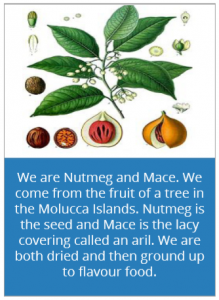We Care About Your Privacy
By clicking “Accept all”, you agree to the storing of cookies on your device to enhance site navigation, analyze site usage, and assist in our marketing efforts. View our Privacy Policy.
This ‘Introduce Me’ activity is a fun and rewarding way to introduce a new topic, while developing language skills.
It’s ideally suited to learners of English, allowing them to hear knowledge presented in different ways, by more than one source, in a non-threatening environment. There’s plenty of opportunity for repetition and rephrasing. This is an adaptable activity to suit any topic where you need to introduce content. This particular example is based on trading goods (see References), but a blank template is provided for you to create your own resource.
The downloadable history cards allow children to take on the role of different ‘goods’ traded by the East India Company or the Hudson’s Bay Company from the 1600s. The children, pretending to be ‘goods’, must meet each other and present themselves in their roles.
The activity uses the ‘Introduce Me’ technique: the children read, memorise and represent information to others, who may then present this themselves to new audiences. Full instructions are provided on the downloadable resource.
Collaborative learning:
- makes challenging curriculum accessible
- improves social relations in the classroom
- provides scaffolding for exploratory talk
If you can't talk it through with others, you won't be able to write it confidently!
We are Collaborative Learning – a network of teachers who develop and disseminate ‘talk for learning’ activities across all subject areas and for all ages.
Our activities are based around the skill of ‘oracy’ – a word originally coined by Andrew Wilkinson, author of Spoken English. Andrew felt that ‘oracy’ matched ‘literacy’ as a skill to be nurtured and developed. He argued that the opportunity to develop confidence in speaking and listening was lacking from the state education system. More recently, research has revealed the importance of the role of talk in developing literacy and in building neurological pathways in the brain.
To encourage oracy, we’ve helped to develop collaborative group work in schools both in the UK and abroad. We started in classrooms where children didn’t possess the cultural capital or the skills to conduct conversations about the curriculum. Many of them, in addition, were learning English at the same time as acquiring curriculum knowledge.
Our activities help children conduct a discussion around a curriculum topic. Children learn to listen carefully to what others have to say and to respond in an articulate and persuasive way. Here’s an explanation of just how our role-play, hot-seating and ‘Introduce me’ activities work: Click here.
At Collaborative Learning, we integrate oracy with curriculum knowledge. Here’s an example of how that works in practice, with a resource which we hope you’ll find useful.

In the resource, you’ll find a set of downloadable cards allowing children to take on the role of different ‘goods’ traded by the East India Company or the Hudson’s Bay Company from the 1600s. The children, pretending to be ‘goods’, must meet each other and present themselves in their roles.
The activity uses the ‘Introduce Me’ technique: the children read, memorise and represent information to others, who may then present this themselves to new audiences. In the process, the information is transformed into personal knowledge.
The activity is particularly helpful for children who are in the early stages of learning English. They’re able to hear knowledge presented in different ways, by more than one source, in a non-threatening environment. There is opportunity for repetition and rephrasing, further developing language skills.
It’s important to note that the role-play cards found in the resource are historically based: they reference events and practices from the past, such as slavery. You can create your own, customisable role-play card by downloading our template resource.
Our collaborative activities are fluid and flexible. Teachers share them on the network for others to use: they can be tweaked to suit your particular curriculum and language development needs. Above all, they’re designed to promote and scaffold purposeful talk and sustained shared thinking.
We hope that you will join our network and contribute your collaborative work for others in turn. You’ll be in good company – there’s a new interest in oracy and group-work nationally, which we trust will grow and strengthen. For more information on initiatives such as the Cambridge oracy network, the English and Media Centre (which promotes group work) and Partnership Teaching (which encourages teachers to work together to devise resources and share good practice), see our Links page.
References:
KS2 National Curriculum: the curriculum requires pupils aged 7-11 years to study ‘an aspect of British history that extends…chronological knowledge beyond 1066’. The activity in this resource focuses on ‘trade’ post-1066. It also anticipates the KS3 curriculum theme of ‘ideas, political power, industry and empire’ (for 11-15-year-olds).
Wilkinson, A (1965), Spoken English, University of Birmingham
An EAL teacher is a professional specialising in working with learners for whom English is an additional language, such as refugees, asylum seekers or children of migrant families.
Learners with speech and language difficulties may find it difficult to remember words or think or the word they want to use when they are talking.
Tip or Idea: Think of a category such as ‘animals’ or ‘things in a kitchen’ and then see how many words you can name. Each time you think of a word place a Lego piece on top of another and see how tall a tower you can build!
Did you know Learning Village supports a wide range of curriculum topics? This allows you to support your SEND learners within the main class environment by offering scaffolded resources.
Tip or Idea: Pre-teaching curriculum-specific vocabulary before a whole class session can help your SEND learners feel more confident and enable them to access class learning more easily.